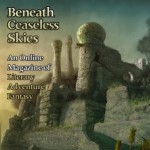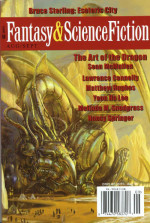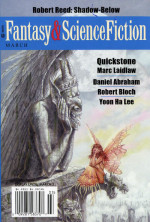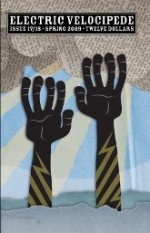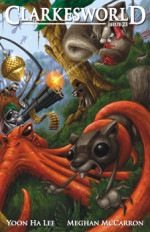short stories
The Pirate Captain’s Daughter
The pirate captain’s daughter had no name, although her mother’s land-born lovers, male and female, sometimes amused themselves thinking of names for her. Such strong hands, such a lithe frame, one might say, and suggest a name from an island known for its wrestlers. Another might admire the way her straight, dark hair was pulled back by pins with dragonflies on them, and name her after summer nights.
Dragon Logic
Once in a realm of islands and morning mist, an emperor’s son died. Perhaps he was murdered by a retainer. Perhaps he ran afoul of a vengeful spirit, or went hunting for tigers in a foreign land, or pined after a lady whose voice burned him with its beauty. There are many ways for princes to perish.
We are not much concerned with the prince. But the empress, oh the empress, she did not weep. They said her face was fair as foam, and that her hair rippled to her feet. She wore the colors of the sky and the colors of the sea, even after the prince’s death, for the white of mourning is a color shared by sky and sea. But her sleeves were dry.
All the empire wept for the loss of this prince, yet in one woman’s heart there was drought.
The Bones of Giants
Whatever else might be said of the sorcerer who ruled the rim of the Pit, he had never been able to animate the bones of giants. The bones lay scattered in the rimlands, green-grey with moss and crusted with crystals, whorled with the fingerprints of desperate travelers. The bones did not easily surrender fingerprints. The locals considered it bad luck to leave their marks on the giants’ bones.
Swanwatch
Officially, the five exiles on the station were the Initiates of the Fermata. Unofficially, the Concert of Worlds called them the swanwatch.
The Unstrung Zither
“They don’t look very dangerous,” Xiao Ling Yun said to the aide. Ling Yun wished she understood what Phoenix Command wanted from her. Not that she minded the excuse to take a break from the composition for two flutes and hammered dulcimer that had been stymying her for the past two weeks.
Through a one-way window in the observation chamber, Xiao Ling Yun saw five adolescents sitting cross-legged on the floor in a semicircle. Before them was a tablet and two brushes. No ink; these were not calligraphy brushes. One of the adolescents, a girl with short, dark hair, leaned over and drew two characters with quick strokes. All five studied the map that appeared on the tablet.
The Fourth Horseman
They’d left the horses behind. This was not, so much as any of them had noticed, a loss. They carried the brimstone hooves and smoke-dream manes with them.
Architectural Constants
The citizens of the silklands and the soldiers of the webroad and the singers of the tunnels have no name for the city. There are other cities upon the world’s restless wheel. There are others more celebrated, whether for the rooted topiary birds that line their boulevards, or their sparkling, improbable hyperbola fountains, or the tame inky warding poems that patrol their walls. There are others with taller spires to focus the unlight of the phantom moon, or deeper dungeons with which to contain the abysses of desire.
Blue Ink
It’s harder than you thought, walking from the battle at the end of time and down a street that reeks of entropy and fire and spilled lives. Your eyes aren’t dry. Neither is the alien sky. Your shoulders ache and your stomach hurts. Blue woman, blue woman, the chant runs through your head as you limp toward a portal’s bright mouth. You’re leaving, but you intend to return. You have allies yet.
Notes on the Necromantic Symphony
Few reliable records have survived of the premiere of Mrod Zogorith’s last and greatest work, the Symphony No. 36 in Mode 9. Zogorith herself vanished after the performance, and morbid rumors in its wake caused the wags to dub it the Necromantic Symphony. It is likelier that Zogorith fled the region during the subsequent Siege of Taruon, or was killed.
The Inferno
Jenna Freeman was beginning to think that she should have listened to her sister before she bought the new viola. It wasn’t that she was superstitious. But the instrument had survived two fires—it still had scarring on its ribs—and the last owner had nicknamed it the Inferno. Jenna’s sister had said, “Don’t you think that’s a bad omen? It’ll inspire a new category of viola jokes.” Only half-listening, Jenna had played a transposed fragment of a Bach partita and was entranced by the Inferno’s tone. It sounded like dark chocolate and red satin ribbons and all things shadowy, exactly the way a viola should be. After that, there was no way not to buy the Inferno.
